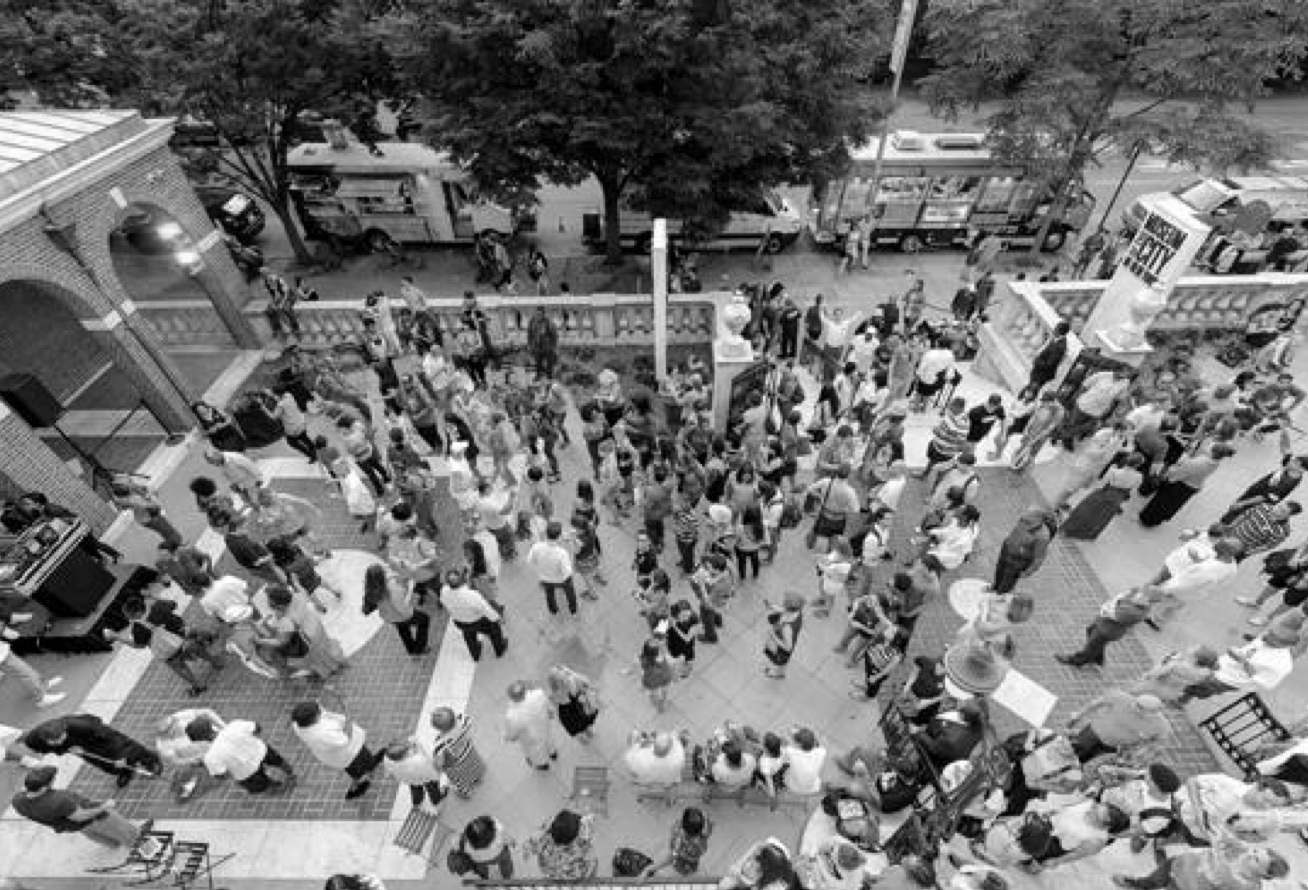Women’s Liberation in New York
The Personal is Political
1960-1982
Ongoing

Back to Exhibitions
It was the 50th anniversary of the passage of woman suffrage, and the Women’s Strike for Equality March, led by the National Organization for Women, was calling for new rights: free childcare, equal opportunities in education and employment, and access to abortion. Among the activists who spoke alongside Millett were Betty Friedan, Eleanor Holmes Norton, and Bella Abzug.
In 1968 The New York Times Magazine published an article coining the term “the Second Feminist Wave.” While women in the 1960s and ’70s often invoked the “first-wave” suffrage generation, they also built on the continuous work of inter-generational New York activists. The women’s movement had long roots, but by 1970 it had arrived.
New York became the organizational and intellectual center of the new women’s liberation movement. New Yorker Carol Hanisch had coined the phrase “the personal is political” in 1968, and the women’s movement increasingly addressed issues of sexual politics, motherhood and marriage, and intersectional identity, along with causes such as equality under the law, financial independence, and gender parity.
The participants’ diverse identities, goals, and anger over their treatment as women sometimes produced conflict and dissent, but they also created a more multifaceted women’s movement than is often remembered—one that has paved the way for the surge in women’s activism today.
Meet the Activists
STEINEM AND HUGHES


STEINEM AND HUGHES
Gloria Steinem and Dorothy Pitman Hughes led a new generation of women’s liberation activists in the 1970s. With others, Steinem, a journalist, and Hughes, a writer, child welfare advocate, and founder of the first shelter for battered women in New York City co-founded the Women’s Action Alliance in 1971 and Ms. magazine the following year. Hughes and Steinem embarked on a national speaking tour in 1971, the occasion for the creation of an iconic photograph by Dan Wynn. In 2013 they re-created the iconic image, highlighting the power of continued alliances and the necessity for an ongoing struggle for women’s rights and civil rights.
Image Info: Daniel J. Bagan, 2013, Museum of the City of New York, gift of Daniel J. Bagan, 2018.32.1.
ELLEN BROIDY


ELLEN BROIDY
Ellen Broidy (right) and other activists interrupted the Second Congress to Unite Women in New York City in 1970 to argue that lesbianism was central to feminist politics. They wore “Lavender Menace” t-shirts to denounce NOW leader Betty Freidan’s characterization of a group of lesbians as a “lavender menace” that could derail the broader goals of feminism. With sustained pressure Friedan and NOW reversed course, but transgender women continued to be excluded and ostracized. Broidy, with Kushner and others, also helped found the annual Christopher Street Liberation March, now known as Pride, the same year.
Image Info: Linda Rhodes, Arlene Kushner, and Ellen Broidy, Diana Davies, 1970, Courtesy Manuscripts and Archives Division, The New York Public Library.
GOLDIE CHU


GOLDIE CHU
The New York-based Asian American Women’s Caucus fought against racism and sexism and trained community leaders. The group sent Goldie Chu to the National Women’s Conference held in Houston, Texas, in November 1977. Chu is pictured here giving a speech at a rally in support of the Equal Rights Amendment in New York City months earlier.
Image Info: Goldie Chu at Pro-ERA rally by Bettye Lane, August 27, 1977, Schlesinger Library, Radcliffe Institute, Harvard University, Courtesy of Gary O’Neil.
Objects & Images
A New York Radical Women Meeting To Plan The 1968 Miss America Beauty Pageant Protest


A New York Radical Women Meeting To Plan The 1968 Miss America Beauty Pageant Protest
New York women protested their exclusion and depiction in a range of media. This photograph shows a planning meeting for the demonstration against the 1968 Miss America Beauty Pageant in Atlantic City, New Jersey, at the NYRadical Women’s office. At the protest women compared the contest to a livestock show by parading around a sheep, and draped bras and other articles of clothing over a large woman puppet—an action that helped create the myth of bra burning.
Image Info: Bev Grant, 1968, © Bev Grant Photography.
Hat Belonging To Bella Abzug


Hat Belonging To Bella Abzug
A generation of women who participated in the women’s liberation movement also ran for elected office in New York. Bella Abzug and Shirley Chisholm represented New Yorkers in Congress, while Carol Bellamy and Constance Baker Motley broke barriers for women in city government. Abzug was known for her large hats and even larger personality.
According to “Battling Bella” herself, “Working women wore hats. It was the only way they would take you seriously. After a while I started liking them. When I got to Congress, they made a big thing of it. They did not want me to wear a hat. So I did.”
Image Info: 1960s-1970s, Museum of the City of New York, gift of Liz Abzug and Eve Abzug, 99.33.5.
Flyer, “Women! Let’s Give Them Back Their Vote!”


Flyer, “Women! Let’s Give Them Back Their Vote!”
Some activists in the women’s liberation movement rejected the American political system entirely, rather than seeking to change it from within. This flyer urges women to reject voting as a “worthless token” of power until a revolution in gender relations occurs. Radical New York groups such as the Redstockings, W.I.T.C.H., Radicalesbians, and New York Radical Women waged direct action campaigns and creating spaces for women at “consciousness raising” meetings, women’s bookstores, and other spaces in the city.
Image Info: 1970s, Courtesy Tamiment Library & Robert F. Wagner Labor Archives, New York University.
Women Strike For Equality Day


Women Strike For Equality Day
On the 50th anniversary of national woman suffrage, Betty Friedan, author of The Feminine Mystique and first president of NOW, spearheaded the Women’s Strike for Equality march down Fifth Avenue with other groups.
Image Info: August 26, 1970, courtesy New-York Historical Society.
Women’s Strike, August 26


Women’s Strike, August 26
Women’s Strike for Equality Day emphasized five issues central to second-wave feminism: equal employment and educational opportunities for women, childcare services, the legal right to abortion, equality under the law, and political power.
Image Info: August 26 Women’s Strike Committee, 1971, courtesy Library of Congress, Prints & Photographs Division.
Black Woman’s Manifesto


Black Woman’s Manifesto
Black women participated in all facets of the women’s movement, but they also formed their own groups that explicitly joined issues of race and gender. The Third World Women’s Alliance, organized by Frances Beal in New York in 1968, addressed poverty, welfare rights, and reproductive justice for all women—issues they critiqued white feminists for excluding. In 1971 they launched Triple Jeopardy, a newspaper addressing what they called the “triple oppression” of third-world women: racism, sexism, and imperialism, all rooted in capitalism. This booklet has Beale’s classic work on this topic, and it also features poetry and other essays.
Image Info: Third World Women’s Alliance, early 1970s, collection of Interference Archive.
Ccny Women’s Day


Ccny Women’s Day
College campuses became key sites of women’s organizing and community.
Image Info: May 7, 1973, Museum of the City of New York, gift of Mary M. Cope, 97.102.8.
Fifth Avenue (husband Liberation)


Fifth Avenue (husband Liberation)
As the women’s liberation movement gained momentum, anti-feminist campaigns gained traction during the 1970s. Fights over the ERA and abortion in particular—more politicized than ever in the wake of Roe v. Wade—created division. Conservative women like Phyllis Schlafly led the national campaign against the ERA, characterizing it as a dangerous erosion of women’s roles as wives and mothers at home.
Image Info: Richard Busch, 1974, Museum of the City of New York, gift of Richard Busch, 2017.36.10.
International Women’s Day


International Women’s Day
New Yorkers’ fight for gender inequality did not end in the 1970s. Photographer Cindy Trinh captured this participant in an International Women’s Day gathering at Washington Square Park on March 8, 2017. International Women’s Day began in New York in 1908, but it drew increased participants in 2017, reflecting the increased wave of activism in the city during the candidacy and presidency of Donald Trump that included, most notably, the Women’s March first held on January 21, 2017, and #MeToo .
Image Info: Cindy Trinh, March 8, 2017, © Cindy Trinh.
Key Events
| Global | Year | Local |
|---|---|---|
| 1917 | New York women win the right to vote; the 19th Amendment enfranchises women nationally three years later, but certain state and federal laws block many women of color from the polls | |
| The Food and Drug Administration (FDA) approves the first oral contraceptive, Enovid | 1960 | |
| The President’s Commission on the Status of Women, led by Eleanor Roosevelt, releases its first report; Congress passes the Civil Rights Act, which prohibitions discrimination in employment based on race, color, national origin, religion, and sex | 1963 | |
| National Organization for Women founded | 1966 | |
| 1970 | Women’s Equality Day march in New York City | |
| The Supreme Court establishes the right to abortion in Roe v. Wade | 1973 | |
| The Equal Rights Amendment fails to be ratified | 1982 | |
| 2017 | Women’s March in Washington, DC, New York City, and across the country |


